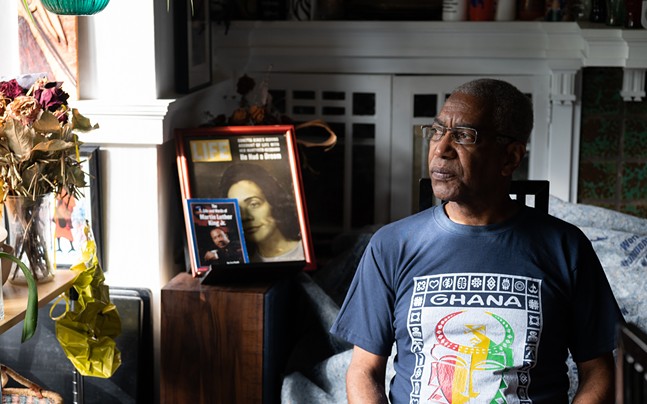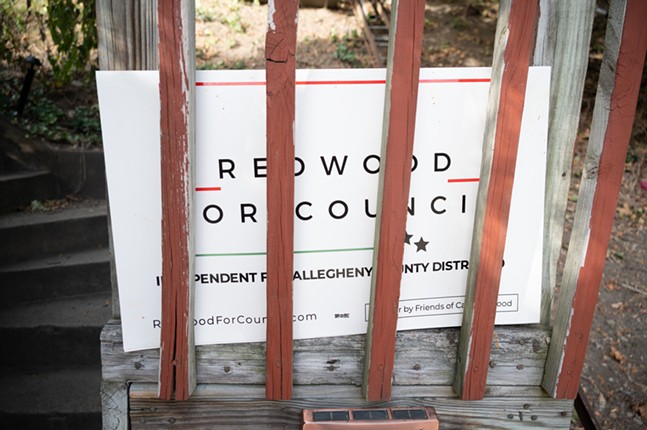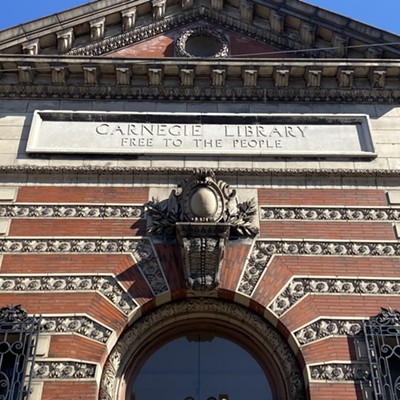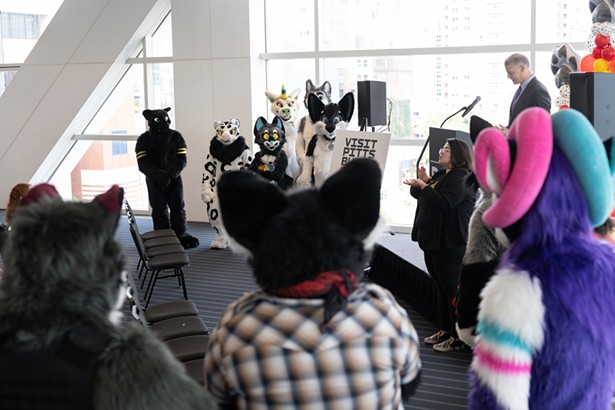Carl Redwood and Sam Schmidt want Allegheny County voters to dream big
[
{
"name": "Local Action Unit",
"component": "24929589",
"insertPoint": "3",
"requiredCountToDisplay": "1"
}
]
Carl Redwood is a scholar of lived experiences. As a longtime Hill District resident, prolific organizer, and staunch socialist, he has spent decades addressing the needs of Pittsburgh’s working class. Now, he’s running for Allegheny County Council District 10 to seek radical solutions to what he says are largely ignored problems.
In 1991, Redwood founded the Hill District Consensus Group to amplify the concerns of community members and document displacement. Before that, he helped form a public housing tenant council while studying at the University of Pittsburgh. But his introduction to activism came much earlier—as a child watching his father.
“My father was a community organizer,” Redwood tells Pittsburgh City Paper. “He would bring me with him to community meetings in the Hill District."
Redwood’s family moved from the Hill District to Homewood when he was young. “We were not directly displaced by the Lower Hill destruction, but we were part of that wave of Black people at the end of the 1950’s moving from the Hill District to East End communities,” he says.
In the 1950s and ’60s, the city used eminent domain to raze homes and businesses in the Lower Hill District — displacing over 8,000 residents to construct the Civic Arena. Since then, Redwood has witnessed the continued erosion of cultural neighborhoods as families are forced to relocate and rent prices increase.
The Civic Arena, renamed the Mellon Arena in 1999, held concerts and rallies, and was used by the Pittsburgh Penguins until 2010. It was torn down and replaced with a parking lot in 2012. When the parking lot opened, Redwood and Hill District Consensus Group argued that Lower Hill should receive a share of the profits, which could go to home repairs, green spaces, and public transportation.
Collective demands are a large part of Redwood’s work across the county. He believes Pittsburgh is a “hot spot” for developers but that communities suffer when they are not included in the decision-making process.
“We’re the target for large-scale commercial developers to come in and make those profits as they push people from traditional neighborhoods where multiple generations have grown up,” he says.
He’s running for county council because things don’t seem to be getting easier for working class people. “The ‘American dream’ seemed possible at one point. That's less and less possible today,” he said.
That’s why Sam Schmidt is running, too. “I don't really see myself represented in local or federal government as a poor person,” she tells City Paper. Schmidt is heavily involved in mutual aid work across the city, making time to distribute with Food Not Bombs every week despite her hectic campaign schedule.
She believes there’s a disconnect between the solutions that the government and stakeholders propose and the solutions that communities really need. “I think a lot of it is a lack of lived experience or lack of interface directly with the community,” she says.
Or, there are no solutions proposed at all. One example, she says, is the Smithfield shelter, which the county closed earlier this summer. She serves hot food in front of the building on Sundays, and meets people who depended on Smithfield and now have nowhere to go.
“Local government repeatedly closes these structures meant to house people without a solution for where they can go,” Schmidt says. “And it's just over and over again. Whether it's clearing encampments or closing the shelters, where there are not enough beds to begin with.”
Schmidt argues that mutual aid groups can act as models for local government. “I think it would behoove local government officials to pay closer attention to what those mutual aid and community groups are doing,” she says, “because it is working on a smaller scale, and government is able to fund bigger-scale programs exactly like what we already have.”
Schmidt is running for Allegheny County Council District 13. She and Carl Redwood teamed up when they realized they not only share a border, but also share many of the same values.
“We basically realized that our platforms were so closely aligned and that our values were so closely aligned that it would be easy for us to endorse each other,” she tells CP. “Our districts are neighboring, and they make up a really important part of Allegheny County.”
The two organize events together and publicly support one another’s campaigns. Schmidt began her bid for county council after incumbent Liv Bennet announced she would not be seeking another term.
“She encouraged me to get on the ballot and has been so supportive since then, so that is a really beautiful thing,” Schmidt says. Redwood is running against incumbent DeWitt Walton, a Democrat and frequent supporter of County Executive Rich Fitzgerald.
Both Schmidt and Redwood are running as Independents, which makes their coalition-building that much more important. “I don't have the tools and resources that a Democrat or Republican might have when they run,” Schmidt says. “But I feel like we are steadily overcoming those barriers.”
They have been endorsed by organizations like UNITE!, Sunrise Movement Pittsburgh and PA Working Families Party, as well as community leaders including County Councilor Bethany Hallam.
Carl Redwood and Sam Schmidt share a vision for Allegheny County — one that is underlined by a transition from private ownership to public ownership. One of Schmidt’s focuses is on the Allegheny County Jail and other local detainment facilities.
The Allegheny County Court of Common Pleas recently announced that the Shuman Juvenile Detention Center would be reopening under contract with Adelphoi, a private company that has faced “cash for kids” and sexual abuse allegations. County Council has since voted to file suit, saying the deal was made without their approval.
Schmidt condemned the deal, advocating instead for investments in trauma-informed care. “We can help folks by creating communities of care as opposed to carceral systems,” she says. “And as long as carceral systems for children or adults exist at all, they at least need public oversight and public ownership.”
Redwood argues that public ownership is also a solution to much of the county’s housing crisis.
“Allegheny County, five years from now, could be a model for other counties around the country,” Redwood shared. “We can take the lead in building out more and more affordable housing that is publicly controlled and not privately controlled.”
One way Redwood hopes to achieve this is through community land trusts and cooperative housing. He knows that won’t be easy—in fact, he says that many of his ideas go against the grain of trends in Allegheny County. “Which is to shut down public and increase private. We need to go in the other direction.”
Both Redwood and Schmidt advocate for a tenant’s bill of rights in Allegheny County. Schmidt hopes to also establish a tenant’s right to attorney in disputes with landlords. “We all know that when we are accused of a crime, we have a right to an attorney. When you are sued for eviction, you do not have that same right,” she said.
Redwood and Schmidt say they’re energized by the community support they’ve received, especially from young people. “Young people are more open to change, experimenting with new ways of doing things,” Redwood said. “It’s the vibrancy of the youth that will really be the thing that pushes our world forward.”
“You know, I'm, like, one of the older people in this group of volunteers that I'm usually working with,” Schmidt says with a laugh.
Schmidt hopes that her campaign will inspire more people to get involved in their communities.
During our conversation, Schmidt’s campaign manager, Jon Hanrahan, was reminded of a neighbor who heard about her mutual aid work at a houseparty and wondered why more people don’t get involved. “And then, within a few days, he showed up and helped Sam out on a shift distributing meals,” Hanrahan tells CP. “That small tweak of the imagination can unlock a lot for people.”
Redwood believes we need new frameworks to meet the needs of community members. “It's important that we organize residents in the community and provide a new vision for what our world could be like,” he said. “What my role is, and what our role is as progressive folks, is to start to make what is impossible today, very possible tomorrow.”
















